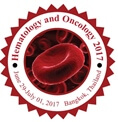Nida Anwar
Pakistan
Title: Clinicohematological and Cytogenetic profile of Myelodyplastic syndromes in Pakistan- Compare and Contrast
Biography
Biography: Nida Anwar
Abstract
Background: Myelodysplastic syndromes (MDS) are clonal stem cell disorders characterized by cytopenias, ineffective hematopoiesis and morphological dysplasia. Bone marrow cytogenetics, inspite of being incorporated as mandatory tool in diagnosis are done less frequently due to limited availability of this technique in Pakistan. Most of the cases of refractory cytopenias are not diagnosed for MDS. Impact of racial difference on disease biology and clinical behavior was evaluated in previous Asian study but not been well established.
Objective: The study was done to evaluate baseline clinicohematological characteristics of patients presenting with MDS, evaluate their cytogenetic profile and compare our analysis to what has been reported previously.
Material and Methods: Cross sectional retrospective study done at National Institute of Blood Diseases and Bone Marrow Transplant, Karachi Pakistan from 2010 till 2016.
Results: Total of 177 patients diagnosed with de novo MDS were included in the study having median age 51 years and male to female ratio of 3:1. Pancytopenia was observed in 80(45%) patients and bicytopenia in 74(42%). However, 23(13%) of our patients had cytopenia with one cell lineage. Mean Hb% was 7.8±2.18 g/dl, mean total leukocyte count 8.8±13.6x10^9/L, and mean platelet count was 82 ±95.7x10^9/L. Absolute neutophil count (ANC) of <1.8 was found in 78(44%) and >1.8 in 99(56%). Out of total, 170 (96%) were transfusion dependent. Most common presenting complaint was loss of appetite in 173(98%). History of recurrent infection was found in 21(12%). Bacterial infections were observed to be the most common. Co morbidities were observed in 116(66%) of patients including hypertension and diabetes miletus . Refractory cytopenias with multilineage dysplasia (RCMD) was the most common encountered WHO category. 98(55%) patients had their karyotype done at the time of diagnosis out of which 44(45%) had abnormal karyotype; complex karyotype was most common abnormal karyotype in 12(12.2%) patients followed by Monosomy 7 in 7(7.1%).
Conclusion: We found younger median age at diagnosis, higher mean WBC count and majority of patients without history of recurrent infections. Karyotypic abnormalities carry a very important role in the diagnosis and prognosis of MDS. Complex karyotype and Monosomy 7 carry bad prognostic implications and early disease transformation to acute myeloid leukemia. Monosomy 7 being associated with bad overall survival, such patients must be identified early with close clinical follow up and offered allogenic stem cell transplant. This is the largest cohort of patients of MDS evaluated for baseline clinical and cytogenetic characteristics in our country.

